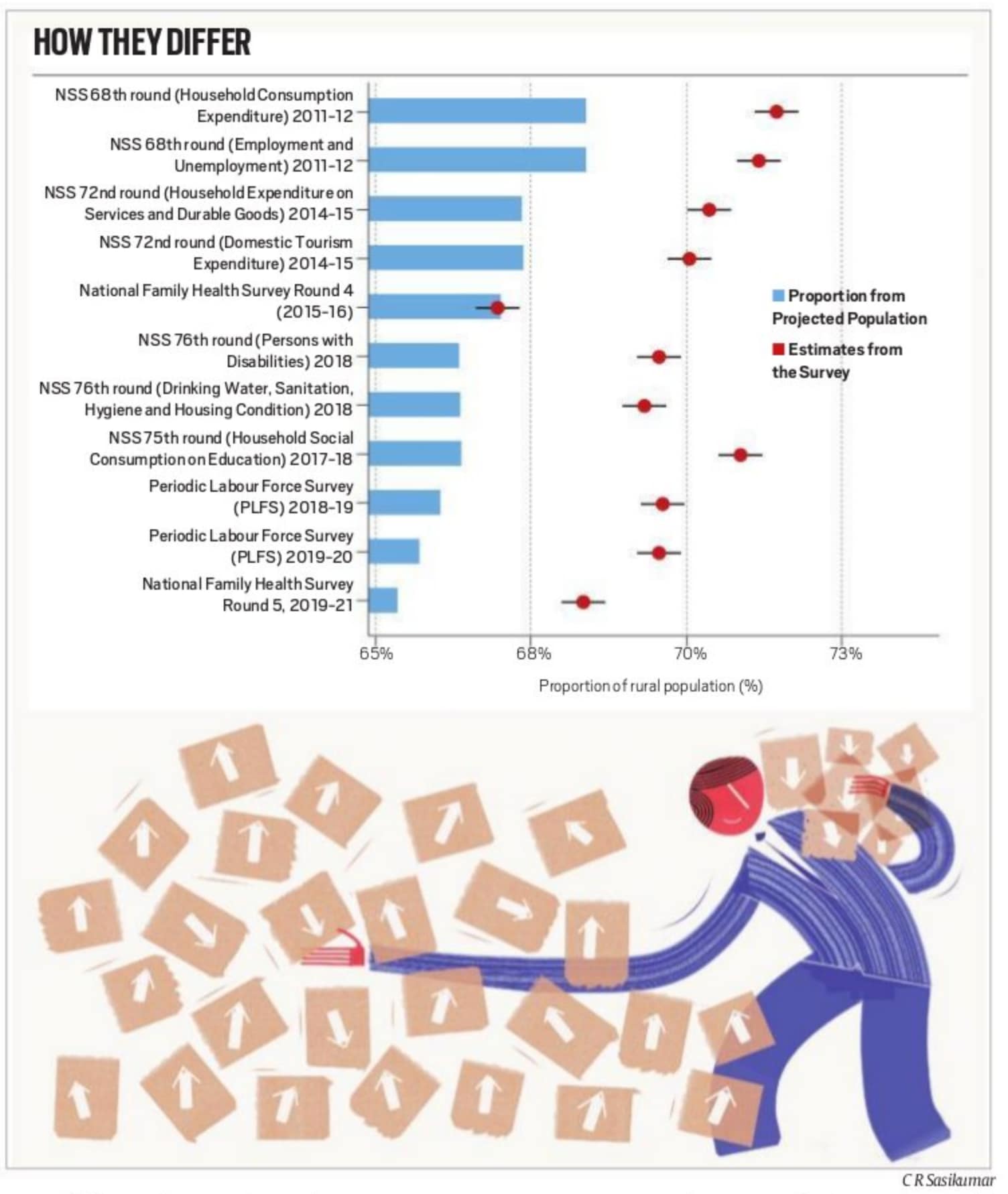Opinion Shamika Ravi writes: Our national surveys are based on faulty sampling
Major surveys that policymakers rely on — NSS, NFHS, and PLFS — are based on unsound data collection frameworks, and systematically underestimate India’s progress and development
 It is important to appreciate that the population projections themselves fall short of the rapid pace of change on the ground. (Illustration by C R Sasikumar)
It is important to appreciate that the population projections themselves fall short of the rapid pace of change on the ground. (Illustration by C R Sasikumar) In India, estimates related to poverty, growth, employment, and unemployment are fiercely scrutinised and debated. Given the importance of these data in framing policies that have implications for more than a billion people, it becomes imperative that the surveys that produce these estimates are conducted at regular intervals in a pre-determined timely manner and are of the highest quality. For data to inform policy, three issues merit consideration: One, availability of data, two, transparent and robust statistical analysis, and three, data quality.
In India, policymakers typically rely on the estimates of sample surveys of households to assess previous policies or to frame new policies. For example, the National Sample Survey (NSS) of households has been conducted to determine the household consumption expenditure, including services or durables, or to provide estimates of persons with disabilities, or to provide estimates of expenditure related to domestic tourism, or to provide estimates related to drinking water, hygiene, conditions of the house, etc. For health, policymakers rely on the National Family Health Survey (NFHS) and the Periodic Labour Force Survey (PLFS) for questions related to employment and unemployment. Even though academics and journalists lament the non-frequent nature of some of these surveys (in particular, the household consumption expenditure survey), and there is a constant demand for increasing frequency and size of surveys, there is practically a consensus on the robustness and the representativeness of the survey methodology. There have been virtually no concerns or studies on these surveys’ data quality.
In this essay, I wish to highlight this major gap. In particular, show quantitively that the data quality related to NSS, NFHS, and PLFS needs a major sampling overhaul to reflect the true status of India’s real economy. These surveys use outdated sampling frames and hence, are not representative. In fact, the survey mechanisms are archaic and not adapted for rapid changes. As a consequence, these surveys grossly and systematically underestimate India’s progress and development and the misleading estimates from these surveys impede policy-making. Framing policies based on these estimates are unlikely to yield the desired results and we will continue to see a gap between ground realities and survey estimates.
Using projected population estimates, we find that nearly all major surveys in India that were conducted post-2011 and used the Census 2011 for the sampling frame have overestimated the proportion of the rural population significantly. This is one of the several problems with data quality, but it is a critical concern — and appropriately highlights the problem at hand.
The graph below shows the projected rural population of India over the years 2011 to 2021 and compares these with the estimates of rural population from the major surveys during this period. As is evident, every survey (except NFHS-4 of 2015-16) underestimates the proportion of the urban population or overestimates the rural population significantly compared to the population projections based on the Census 2011. A key implication is that the differences in estimates are significant and indicate major concerns in sample design across all these surveys. Moreover, it is important to appreciate that the population projections themselves fall short of the rapid pace of change on the ground. It is well documented that the proportion of the urban population based on a projection from Census 2001 grossly underestimated the speed of urbanisation in India. The proportion of the urban population that was projected to be achieved by 2016 was already achieved by 2011, according to Census 2011.
 How they differ
How they differ
Then there is the problem with the response rate. Not everyone who is sampled will respond to the survey questionnaire. The refusal to do so is never random, and our analysis shows that this is systematically correlated with wealth levels. The response rate falls with growth in income and wealth of households. This relationship is particularly strong for men and their response rate falls sharply with rising wealth levels. So once again, not correcting for such errors will most definitely lead to misleading estimates from the surveys, however large the sample size. If we continue to raise sample size without correcting for such non-sampling errors then the estimates from such large surveys will be “very precisely wrong”.
Given that rural and urban estimates are closely related to almost all variables of interest, such as health outcomes, wealth and asset ownership, poverty, employment and unemployment, growth etc, the resulting estimates from these surveys would over-represent the rural population and therefore systematically underestimate the improvements across the economy.
In fact, what is evident from the analysis is that the greater the improvement on the ground, the greater will be the bias in the survey estimates. The Indian economy has been incredibly dynamic in the last 30 years with significant policy reforms and subsequent major breaks in the long-term structural growth path. India is urbanising at a rapid pace, and often defying the expectations and projections based on past trends. A large part of statistical reforms should not merely focus on the availability, frequency and largeness of data, but greater emphasis should be placed on data quality.
The writer is Member, Economic Advisory Council to Prime Minister of India





